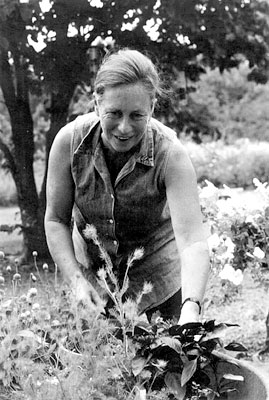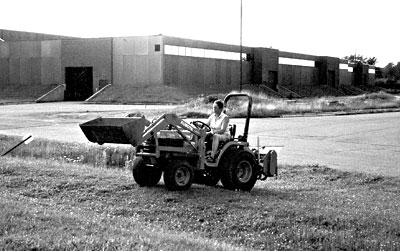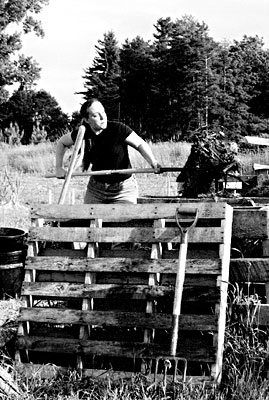 |
| The unstoppable Claire Ackroyd. Photo courtesy of Shannon Commeau. |
By Rhonda Houston (Tate)
Spending any amount of a warm, dewy, June evening on the interstate is my idea of punishment. Exiting the interstate on the Hogan Road in Bangor and pushing past every large car dealership north of Portland while swerving around recently licensed, teenage mall dwellers could be classified as cruel and unusual. How pleasant, therefore, to fight through the big box stores and sea of pavement and stumble upon something utterly organic, fresh and truly cooperative in nature.
In a 60-by-60 plot of earth, a bit of magic is being performed, and its effects are slowly rippling through a community. The sorceress is Claire Ackroyd, a landscaper by trade and organic enthusiast by heart. Her co-conspirators are a crew of local master gardeners, two junior high science classes, a steady stream of adult education students, future culinary artists and carpenters, Crew D of the Station Five firehouse, and a fabulous group of community friends and volunteers. With the very hands-on support of a creative board and administration, including an assistant principal who refuses to relinquish his role of “tractor jockey,” Ackroyd has enlisted the help of grant organizations, Maine Initiatives, the Maine Community Foundation and local philanthropists, Stephen and Tabitha King.
What is this remarkable woman doing that has garnered all this help and attention? Most recently she has been transforming the exterior of the United Technologies Center (UTC) into a demonstration of what a community can accomplish with a bit of leadership, philanthropy, volunteerism and good compost.
The UTC, located on the Hogan Road in Bangor, is the vocational and technical school serving 31 area towns. The mission of the Center is to provide quality technical programs designed to meet the individual needs of its students and the collective needs of the community. In addition to providing opportunities for a technical education to area high school Juniors and Seniors, UTC collaborates with Bangor Adult Education to offer learning opportunities to all members of the community. Its philosophy is that learning is a lifelong process, and the variety of evening courses available to the general public is a testament to this ideal.
The UTC has embarked on an evolutionary process, eliminating programs that encouraged dead-end jobs and embracing new programs that keep students moving with current trends and technology. In this evolution, the Community Garden program has taken root. The history of the program is as patch-worked as the best homemade quilt, pulling from and incorporating as many disciplines and people as possible. It began, as most grand gardens do, with a small piece of untended earth that was crying for attention.
 |
| Ackroyd on the Kubota tractor, purchased with funds from the Stephen and Tabitha King Foundation. Rhonda Houston photo. |
“I’m not unhappy to generate a program out of thin air and duct tape,” begins Ackroyd. After guest lecturing at UTC, Ackroyd was hired to teach an adult education class that focused on building a flower bed. The simple, 30-foot flower bed filled with common perennials grabbed the attention of students and faculty. A well-kept lawn and a sparse scattering of trees surrounded UTC, so the small bit of landscaping was a welcome addition and was in step with the new interior that was forming inside the building. Greg Miller, director of UTC, is slowly and steadily converting the once brick and mortar, institutional building into a miniature college campus, complete with a new café with recessed lighting, lots of glass and wood. Ackroyd’s need to make the outside of the building reflect the exciting happenings on the inside instigated a flower bed, which, in turn, instigated the entire Community Garden project.
“You realize how starved people are. I’m still amazed at the impact my one flower bed had.” Ackroyd adds that the flower bed was no feat of landscaping genius, but the effect was rewarding. “So we made another one.” The Maine Landscape and Nursery Association took notice of Ackroyd’s improvements and decided to volunteer as well, donating time and resources to plant the berm in front of UTC. Ackroyd’s enthusiasm was infectious, and after spending an hour with Ackroyd, it is clear that once she is moving, slowing her down is very difficult. Two gardens were not enough, but with a limited budget and no academic category for a Community Garden, she was indeed going to have to put her program together from thin air and duct tape.
The Education of the Sorceress
“I grew up with my seriously gardening granny,” says Ackroyd. She believes that her passion for gardening comes from following her family’s crazy old Irish gardener, who had a tendency to turn her Gran’s prized rose gardens into potato patches. Her childhood in Kent, England, playing in her family’s many gardens, spurred an education in horticulture from the University of Bath, in Bath, England.
Graduating from Bath in the late ’60s, Ackroyd was hesitant, like many in her generation, to settle into a career. She moved to Burlington, Vermont, to pursue her Masters at the University of Vermont. After a great deal of “piddling around,” she received her Masters in Horticulture from the University of Maryland. She was pulled to Orono, Maine, where she began working in neighbors’ gardens as a means of supporting herself while waiting for her Visa to be processed by the U.S. Government. Her small gardening business turned into The Growing Concern, a landscaping and nursery business, which she ran for nearly 20 years – after which she was burned out. “Landscaping is a terribly under-respected profession,” says Ackroyd, “which is too bad because it’s one of the most difficult things to do well. It’s like herding cats! It’s making art out of living creatures.”
After giving up the business and moving to Massachusetts for a brief time, Ackroyd returned to Orono determined to make a living “by hook or by crook.” Her determination to avoid the nursery business led her to a very wide array of jobs, including inspecting organic farms for MOFGA, tutoring high school students, teaching courses in the University of Maine’s landscape horticulture program, and working as an interviewer for the Margaret Chase Smith Center for Public Policy at the University of Maine. Organic farm inspections were a natural choice for Ackroyd’s background and ended up becoming her “school for organic production.” Much of her knowledge of growing organic vegetables has come, not from her Master’s work, but from inspecting a variety of Maine’s organic farms. While interviewing families, Claire was startled with the “gap between the haves and the have-nots.” Her eyes were opened to a very real problem in Maine and elsewhere. While tutoring high school students she began to feel a deep irony and sadness “to work for wealthy people designing beautiful gardens and then tutoring kids from families who couldn’t afford a dentist. It was appalling.”
 |
| Connie Coffin, Director of the Adult Education Program at UTC, joined Ackroyd’s gardening group one day by helping to turn compost. Rhonda Houston photo. |
Beyond the harsh lessons she was taught, Ackroyd also learned that she had a passion for working with teenagers. A friend and faculty member at UTC invited Claire to one of her classes to lecture on taking care of household plants. That one class turned into an adult education class on planting a flower bed, and soon enough, Ackroyd was a constant face at United Technologies Center.
Planting the Seeds
“All kinds of gardening can be learned by all kinds of people.” – from Ackroyd’s grant application to Maine Initiatives
The passions of Claire Ackroyd are many and varied. She saw the possibility to get much information out to the public – practicing horticulture sustainably, using native plants, adopting organic practices, integrating diverse people into the process – but she needed funding and a purpose. The Community Garden was born, in a hard clay that was busy growing cattails. The Harvest Fund, a program of Maine Initiatives, awarded UTC a $1,500 grant to create a community garden that involved two middle school science courses, as well as adult education classes.
In the winter of 2001, Ackroyd collaborated with students from the Veazie Community School and the Doughty School in Bangor. While snow was falling, students visited the site of the soon-to-be community garden and put their math skills to work. Figuring plot size, row size and just what to plant can be challenging for the most advanced gardeners, but the group of sixth graders took it all in stride. The students were required to work physically in the garden and to keep a garden diary.
The challenge for Ackroyd was not only to organize these fledgling gardeners, some of whom were unsure where tomatoes come from beyond the produce section of their local grocery store, but also to create a garden in the clay soil. “We became composting freaks,” she explained, as she instructed adult students of her organic gardening course on the finer points of turning compost. Before students could work the soil, Ackroyd approached her neighbors at Station Five firehouse to see if they could assist. She found there a group of “universally friendly, helpful, good-humored guys” who put the fence up around the garden, offered assistance when the middle school students would come en masse, provided water and garden help when summer rolled around and students disappeared to vacation, and, most importantly, offered an outlet for all the good veggies. “It’s really nice to have someone to give veggies to,” Ackroyd explains. “The (firefighters) are terribly receptive to being given food and are always willing to help.”
Frank Rollins, Captain of the Crew D gardening firefighters, was amazed at what Ackroyd had accomplished in the firehouse’s back yard. Claire took what was once an eyesore “and in one year turned it into viable soil with organic compost, which I’m now doing at my own home.” What Rollins and his crewmates take from this project, aside from a supply of fresh veggies, is exactly what Ackroyd intended. Her vision of teaching people how to garden and landscape sustainably and organically appears to be making a difference already.
 |
| The “universally friendly, helpful, good-humored guys” at the Station Five firehouse fenced the UTC garden, provided water and gardening help in the summer, and even helped eat some of the vegetables. Rhonda Houston photo. |
Revolutionizing Future Chefs
“Oh boy, I’ve got a lot of work to do … but you have to do it one kid at a time.” – Claire Ackroyd
The carpentry students built a potting shed, the culinary arts students saved their kitchen scraps, local landscapers dropped off grass clippings, woodsmen hauled in chips, and together they built a compost pile that would catch the eye of any compost connoisseur. Once composted, the organic matter was plowed in by local farmers. The garden took shape with a most cooperative effort and was celebrated with the usual abundance of a Maine vegetable garden. With the excess abundance, and firefighters with veggies aplenty, Ackroyd approached the culinary arts students with a bunch of tomatoes. With great enthusiasm, the students made tomato pastes and sauces to be frozen and used throughout the year. Though the Community Garden Project was never intended to become part of the high school curriculum at UTC, the students are becoming involved nevertheless.
When the grant from the Harvest Fund expired, Ackroyd needed to find a new focus for the project. Previously the garden had been by and for the middle school students. She now saw a way to make the garden by and for the culinary arts students. The garden would be tended by students in Ackroyd’s adult education classes, such as the Introduction to Organic Vegetable Gardening, which was offered this summer, but the planning would be done by the culinary arts students who wished to participate. Last spring, interested chefs-to-be pored through seed catalogs, figured amounts needed and ordered herbs and vegetables. This fall, they will harvest their vegetables and learn to cook with produce straight from the garden. The garden was designed to be full of late harvest storage crops with lots of carrots, beets, storage onions, tomatoes, peppers, potatoes and beans. Ackroyd notes the limitations of a late harvest garden but adds, “We’ll get this better as we go.” It is very important to Ackroyd that the students harvest the vegetables with her, to gain a sense of the source of the food they use. “Some of these kids are really catching on; harvesting veggies will be a serious part of their curriculum next fall.”
Training future chefs to value the source of their ingredients is now a pivotal role of the Community Garden project. “I regard this as a terribly potent, revolutionary program on a tiny scale.” Ackroyd muses that a conference held last fall at the Castine Inn really brought this idea into focus for her. The best chefs in Maine were paired with local farmers to discuss using local food. The movement to know where your food is coming from, and UTC’s new emphasis on this, will no doubt produce sought-after chefs and prepare an entire group of students to be responsible in their career and culinary choices.
A Jump in Technology
With the culinary arts students now depending on the harvest of the garden, Ackroyd realized a need to step up production. The first innovation came in the form of a Kubota tractor purchased with funds from the Stephen and Tabitha King Foundation and a “screaming deal” from Dorr’s Equipment. The tractor was a welcome addition, as the school had previously relied on the volunteer work of local farmers. Though finding farmers willing to help was not difficult, finding time for them to take out of their own hectic growing season was a challenge. With the small tractor, Ackroyd and other UTC employees can now work much more efficiently in the garden and produce a better crop.
The tractor was a huge success, but Ackroyd knew the program would always be limited without the use of a greenhouse. “It’s hopeless in New England to try to teach horticulture in the winter. I was trying to teach classes on forcing bulbs in the heavy machinery classroom …” Ackroyd applied for and received a grant of $6,180 from the Maine Community Foundation to relocate a greenhouse that belonged to International Paper and was sitting idle on City of Bangor property.
Andrea Perry of the Maine Community Foundation says, “We are normally hesitant to fund ‘bricks and mortar’ projects through our community building grant program; however, we made an exception based on the extent to which the project demonstrated our grant priorities. The UTC fostered a cooperative approach to community issues through collaborations, and the grant had the potential to serve as a catalyst for attracting other resources.”
The greenhouse, when it is rebuilt, will cover a small area next to the current plot and be used to extend the growing season into the school year. Perhaps even more exciting, this grant also funds an adult education class on building a solar greenhouse, tentatively to be held this fall and taught by local nurseryman Michael Zuck. “Michael is the Eliot Coleman of greenhouses, and we are fortunate to have him,” according to Ackroyd. Though faculty members had considered working only with the donated greenhouse and making do with its limitations, Zuck proposed building another one from bottom up. “We’ll build the best one that we can; a small, solar house. We are doing what UTC is happy doing, using state-of-the-art technology.” Once built, the greenhouse will greatly expand the possible class offerings.
In addition to more classes on gardening techniques, Ackroyd hopes to instate a class on Harvest Cooking. While Bangor residents learn how to grow their own vegetables, they also need to learn what to do with their food. Ackroyd intends to recruit friends with cooking expertise to cover the basics of cooking with one’s own (or local farmers’) harvest as well as the basics of canning and storage. These aspects of cooking are being lost in the generations who grew up on fast food and microwaves. “This is not gourmet cooking. This is practical, homeowner cooking; go to the market or your back yard. It’s cheap, it’s seasonal, it’s healthy, it’s easy to make and it’s delicious.” With everything from greenhouse building to canning tomatoes, UTC hopes to entice a whole new group of community members to become involved with the program.
A Growing Garden
“Being a private consultant for people has been so much fun,” says Ackroyd, “but it seems to make a lot more sense to find people who wouldn’t have a chance to get instruction and access to the experiences of growing vegetables, landscaping, composting or harvesting their own radishes unless they got it from some program like this.” – Claire Ackroyd
Ackroyd has a vision that extends well beyond the Community Garden that is currently flourishing with the recent rains and warm temperatures. Giving local middle school children a chance to see where their food comes from; local firefighters a project for their often trying 24-hour shifts and fresh veggies for their renowned dinners; culinary arts students exposure to the advantages of using local produce; area community members an opportunity to increase their knowledge or to start from scratch on producing sustainable gardens and landscapes – this just isn’t quite enough for the visionary Ackroyd. She wants to bring her passion for gardening to anyone who hasn’t had the chance to try it yet. She sees an opportunity to involve folks who may be wheelchair bound with raised beds, greenhouse work or more accessible paths. The pleasure of harvesting your own radishes, or Gerbera daisies, should not be limited to any one type of person.
Looking over the small piece of earth that Ackroyd and her volunteers have worked into a flourishing, organic garden and feeling the buzz of the city vibrating beneath your feet, you can easily believe that she will accomplish this goal. Though a bit of the cover crop didn’t germinate, and some wayward middle school students seemed unable to plant a consistent row of onions, the UTC Community Garden is an extraordinary accomplishment. The collaboration of such a diverse group of people has begun what could be considered a uniquely cooperative, true-to-its name, Community Garden. The community fuels it, and the community stands to benefit more than even the ever-hopeful Ackroyd can see.
About the author: Rhonda Houston is a member of MOFGA’s public policy committee and a graduate student at the University of Maine.
